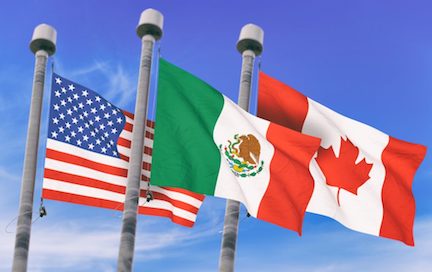The U.S. and Mexico moved closer toward a consensus on how to forge a new North American Free Trade Agreement even though key hurdles remain, according to several people familiar with the matter on both sides of the talks.
Progress has been made during five weeks of discussions between the U.S. and Mexico on issues including rules for cars, but there’s no broader agreement on reshaping Nafta, two U.S. administration officials said Tuesday night.

Any handshake agreement announced on bilateral issues between the U.S. and Mexico would be the biggest breakthrough in negotiations that began a year ago. Yet certain U.S. demands that affect all three Nafta nations remain unresolved and could still be deal breakers for Mexico and Canada.
Key U.S. demands that neither Mexico nor Canada have agreed to yet include the automatic expiration of the deal after five years, known as the sunset clause; rules for government contracting; and methods for resolving investment disputes, two of the people said.
Canada has no notice of any deal being reached and considers several issues still outstanding, two Canadian government officials said Tuesday, requesting not to be identified to discuss confidential matters.
Sunset Clause
Canada hasn’t been involved in face-to-face negotiations with Mexico and the U.S. for weeks and would have to rejoin talks or negotiate modifications. Canadian Foreign Minister Chrystia Freeland, who is responsible for Nafta talks, declined comment to reporters while leaving a cabinet meeting Tuesday in Nanaimo, British Columbia.
All three countries would almost certainly require approval from their legislatures for a revamped deal. U.S. House Speaker Paul Ryan, who is not running for re-election, has said the deadline has passed to get an agreement through this Congress, signaling strongly any U.S. vote would be pushed to 2019 because of timelines set out in U.S. trade law.
Still, any agreement—even a handshake deal with just two of the pact’s three countries—is something of a milestone for talks that have been under constant threat of falling apart since they started in August 2017.
Trump has repeatedly pledged to withdraw from the 24-year-old pact if he can’t renegotiate a deal that will shrink America’s trade deficit and reverse the flow of U.S. factory jobs to Mexico.
Trump’s negotiating team has offered proposals that at times have caused Mexico and Canada to balk. It has pushed to tighten regional content requirements for car production and to have a certain percentage of cars manufactured by higher-paid workers, which could undermine Mexico.
American business groups have urged the White House to exercise caution, warning that Nafta’s demise would disrupt supply chains and put hundreds of thousands of jobs at risk. Farmers have also said killing the deal could undermine exports, just as a trade war with China eats into their profits.







